Commentary: Budapest 1900: A Historical Portrait of a City & Its Culture by John Lukacs
Lauralei’s Instagram @rebelmouthedbooks: https://www.instagram.com/p/B6mjq6sgLff/?utm_source=ig_web_copy_link
Edit: After reading my original post again, I realized how poorly I had articulated my point. I returned to the writing here in an attempt to better explore what I had been trying to say before.
For those interested in learning about Hungarian history, culture, politics, and, of course, Budapest, then I definitely recommend John Lukacs’s portrait of Hungary’s capital city, Budapest 1900.
Though peppered with Hungarian nationalism, Lukacs impressed me with an evenly tempered analysis, at times pointing adroitly to the truths in fictions and the fictions in truths. For instance, he is one of the few writers of Eastern European history I’ve read who has spoken plainly to the nationalistic behaviors present across Europe in the nineteenth and twentieth centuries.
He wrote,
“By nationalism, I do not mean the perhaps insoluble problem of the non-Magyar nationalities in Hungary. The masses of the Magyar people too were more nationalist than liberal...”
For a Hungarian writer writing about 1900’s Budapest— the heart of Hungarian politics in the age of nationalism— to plainly speak to the discrepancy between the acceptable nationalism of the “great(er)” European powers and the unacceptable nationalism of smaller peoples, especially the minorities in Hungary at the time (Croats, Serbians, Greeks, and others), is both very shocking and very powerful. It speaks to the writer’s critical approach to this history, which was why it was also jarring when he would occasionally slip into highly romantic versions of Hungarians bordering on nationalism, particularly when he made claims about “true” Hungarian nature and character. I believe there is rarely ever such a thing in human societies.
But what I find most moving and fascinating about Lukacs’s text is not the dense, textured portraits of Budapest itself, as transportive as they are, but rather his insertions about the Hungarian language and how it impacted Hungarian history.
He wrote,
“The history of politics is the history of words.”
The Hungarian tongue is not like it’s neighbors. It is not a Romance language nor is it Slavic. It is Finno-Ugric. It is very unique and thus a bit lonely. It’s specialness impacted it’s role in Hungarian life. It is not merely a means of communication, but also a means of identity.
In the 1800s, and well before, Hungary attempted to assimilate its non-Magyar members, including Jews and Slavic groups. Becoming “Magyar” meant adopting the language. If you didn’t speak Hungarian, you weren’t Hungarian.
Though most who lived in Hungary spoke Latin or German or a Slavic language, and because Hungary was a part of an expansive, multinational empire at the time, this assimilation process was slow, but it served the Magyars well in terms of numbers. Hungary, while linked with Austria, tried to make a point that Hungary deserved its own nation— not to be tied to the Empire. One way the Magyar politicians made this point was through population. As people adopted the language, they became Hungarian, thus drastically increasing the number of “Hungarians” in Hungary. The increase in size of the Magyar population demonstrated the nationalists’ point that Hungary deserved its own rule, separate from Austria. Language was a tool for nationalism. But who did it truly serve?
Well, it didn’t serve those who assimilated. It served the ruling class.
Let’s back up.
How did assimilation impact the minority ethnicities in Hungary at the time? They were (broadly) not too happy about it. In this era, it was not just Hungary that experienced national awakening; just about every ethnicity in Central and Eastern Europe at the time was waking up to their national aspirations, normally involving self-determination, sovereignty, and land. There arose a big question: Can these ethnicities assimilate into Hungary— is it even possible to build a truly Magyar nation? Or must the nation be multinational?
At the time, multinationalism was not going to happen. Magyars wanted a Magyar state. They were okay with minorities assimilating, but they could not belong to Hungary if they wanted to speak their own language or live their own culture. But what happened after assimilation? What was the benefit? Power? Voice? Representation?
Here is where language comes into play again.
“The word ‘nation’ in Magyar, in 1900, and even later, still had a special sense. It was not at all identical with ‘people’ (as for example Volk in German.) It meant the lawful minority of nobles and petty nobles, that is, the ‘historical’ class.”
This means that, when Hungarian leaders were talking about nationhood, they were actually talking about the political domination of the nobility. The word nation (at this time in Hungary) did not mean simply a geographical collective of one people. Nation meant the nobility and their ability to control the political landscape of Hungary. To be Magyar was not to belong to the people; to be Magyar was to belong to the ruling class.
All of this to say: Even if you assimilated into the culture of Hungary, even if you adopted the language, unless you were a noble, you were not a part of the nation. The minority ethnicities in Hungary felt this. Assimilation was forced through language, education, and civic engagement, but even if one assimilated successfully, there was still a gap in power. Increasing the “Magyar” population served the ruling classes by making an argument for Hungarian nationhood.
It served the ruling class.
Now, a lot of this can also be ascribed to other nations in this era— not just Hungary. I’m not singling Hungary out, rather, I am pointing to a unique linguistic layer to self-determination. How does language impact our understanding of politics? How can language affect the course of history? How does language separate us? And, ultimately, who does it serve?
